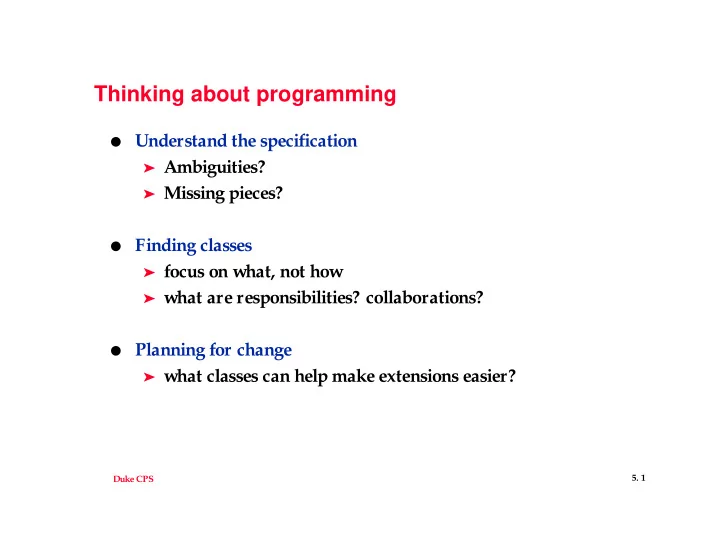

Thinking about programming ● Understand the specification ➤ Ambiguities? ➤ Missing pieces? ● Finding classes ➤ focus on what, not how ➤ what are responsibilities? collaborations? ● Planning for change ➤ what classes can help make extensions easier? 5. 1 Duke CPS
Designing Classes and Programs ● Where do classes come from? ➤ nouns: brainstorm, cull, combine, divide ➤ attributes vs. classes, keep cohesion high ● Things to watch out for ➤ kitchen sink classes: keep classes highly cohesive ➤ God classes: know about everything in the app ➤ classes with little behavior (only get/set), and few collaborators ● CRC cards: classes, responsibilities, collaborators ➤ 3x5 card, class name at top, list responsibilities and collaborators 5. 2 Duke CPS
CRC Card template 5. 3 Duke CPS
Some CBOOCA Questions ● Should a given directory be searched recursively? ● Is there a maximum length on a phrase? ● What constitutes a word? ● How should you deal with the following: the sandman the sand man ● When building phrases, should you observe sentence boundaries? File boundaries? ● How to deal with errors? ➤ cannot find corpus ➤ does corpus need to be a text file? ➤ illegal phrase length 5. 4 Duke CPS
Some CBOOCA Specification Changes ● Additional command line options ➤ -a sort alphabetically ➤ -n sort numerically (default) ➤ -d < dictionary > use only words found in dictionary ● Order of command-line arguments may change (next week) ● Optional features ➤ use web page(s) as corpus ➤ read preferences from .cboocarc file by default, overridden by command-line arguments 5. 5 Duke CPS
Working in teams ● Work together until it is time not to work together ➤ debate the design ➤ do not code until everyone in the group understands design ➤ separate coding into individual tasks ● Controlling the source code ➤ use RCS or CVS (see online resources ➤ build stable version everyday ➤ using afs groups ● Who’s in charge? 5. 6 Duke CPS
Recommend
More recommend